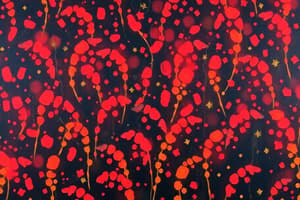Podcast
Questions and Answers
What is the primary role of cytokines in immune responses?
What is the primary role of cytokines in immune responses?
- Acting as intercellular signaling molecules (correct)
- Producing antibodies
- Directly attacking foreign cells
- Facilitating the growth of bacteria
Which type of cytokine is released specifically from T lymphocytes?
Which type of cytokine is released specifically from T lymphocytes?
- Colony-stimulating factors
- Lymphokines (correct)
- Interleukins
- Monokines
How do chemokines primarily affect immune cell behavior?
How do chemokines primarily affect immune cell behavior?
- By enhancing antibody production
- By stimulating proliferation of lymphocytes
- By inducing programmed cell death
- By directing cell movement (correct)
Which of the following cytokines is implicated in stimulating the growth and differentiation of immature leukocytes?
Which of the following cytokines is implicated in stimulating the growth and differentiation of immature leukocytes?
What mechanism describes cytokine effects on the cells that produce them?
What mechanism describes cytokine effects on the cells that produce them?
Which statement correctly describes a characteristic of interleukins?
Which statement correctly describes a characteristic of interleukins?
What induces the production of cytokines?
What induces the production of cytokines?
Which category of cytokines is associated with the tumour necrosis factor family?
Which category of cytokines is associated with the tumour necrosis factor family?
What is the effect of certain cytokines on cell proliferation?
What is the effect of certain cytokines on cell proliferation?
What type of immune responses do cytokines mediate?
What type of immune responses do cytokines mediate?
Flashcards are hidden until you start studying
Study Notes
Cytokines
- What are they? Small soluble proteins or glycoproteins released by one cell population that act as signalling molecules.
- Function: Responsible for immunoregulation, mediating both specific and non-specific immune responses.
- Types of Cytokines:
- Monokines: Released from mononuclear phagocytes
- Lymphokines: Released from T Lymphocytes
- Interleukins: Produced by a leukocyte and act on another leukocyte
- Colony-Stimulating Factors (CSFs): Stimulate the growth and differentiation of immature leukocytes in the bone marrow.
- Categories/Families: Chemokines, haematopoietins, interleukins, and members of the tumour necrosis factor (TNF) family
- Induction: Production is stimulated by nonspecific stimuli (virus, bacteria, parasites, cancer, inflammation) or interactions between T cells and antigens.
- Other Cytokines: Some cytokines induce the production of other cytokines.
- Cell Function:
- Activate: Can stimulate cell proliferation and/or cell differentiation
- Inhibit: Can inhibit cell division and cause apoptosis (programmed cell death)
- Chemokines: Play a key role in the acute inflammatory response by stimulating chemotaxis and chemokinesis.
Chemokines
- Function: Stimulate chemotaxis and chemokinesis (cell movement)
- Role: Crucial for the acute inflammatory response
Studying That Suits You
Use AI to generate personalized quizzes and flashcards to suit your learning preferences.




